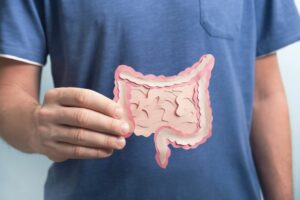IBS or SIBO symptoms? How to tell these common gut issues apart
IBS or SIBO signs and symptoms? Healthista spoke to The Intestine Professionals – Professor Barbara Ryan and Elaine McGowan RD. They reveal how to tell these typical intestine challenges apart, additionally what results in them
Around a single in ten adults and 1 in six women of all ages have IBS.
IBS (Irritable Bowel Syndrome) is a serious, practical gastrointestinal ailment that has an effect on the reduce digestive technique (the little intestine and substantial intestine/colon).
A purposeful condition is one that triggers indicators of health issues, absence of wellbeing and quite typically significantly decreased high quality of daily life, but the place there are no crystal clear steps by which to make a analysis.
This suggests that if you have IBS, all standard assessments (blood perform, stool samples, endoscopies or scans) will be usual. IBS is a person of the most typical ‘functional’ gut situations (there are many others) and in recognition of the very important job of the GBA in these circumstances, they are now called Ailments of Intestine-Mind Conversation (DGBI).
IBS is diagnosed on the foundation of the presence of specified signs (the Rome IV standards) and by ruling out some other prevalent situations that can cause equivalent symptoms (such as coeliac disease or inflammatory bowel ailment- Crohn’s disease or ulcerative colitis).
Browse Extra: Stomach difficulties? 3 typical tummy problems and how to deal with them

SIBO OR IBS – What is the variance?
SIBO is Tiny Intestinal Bacterial Overgrowth. It fairly pretty much implies there is an overgrowth of micro organism in the modest intestine.
Even though the significant bowel is home to above 50 trillion microbes, it isn’t ordinary to have large numbers of micro organism in the little intestine. The overgrowth of microbes can interfere with the absorption of unique food elements and result in fermentation in the intestine.
This can guide to belly soreness, bloating, extreme wind (typically with a solid odour), diarrhoea and other not comfortable intestine signs.
When you search at SIBO signs and the symptoms of IBS, you can see that they are very identical, and there may well be an overlap in some people.
Certainly, experiments have proven that SIBO is up to 4 times more widespread in IBS victims as opposed to ‘normal’ controls and that all around 20-50 for every cent of individuals with IBS have SIBO.
Historically, numerous health professionals believed that SIBO only occurred in people who had other underlying clinical disorders (like diabetes or neurological problems which have an effect on gut motility) or in people with structural abnormalities of their gut (immediately after sure surgical procedures for example).
about 20-50 for every cent of individuals with IBS have SIBO
But there is raising awareness that this is not often the scenario and that SIBO is much more common in individuals with diagnosed IBS and might be contributing to some (or less frequently, all) of the IBS-sort signs and symptoms.
Prognosis of SIBO is not a fantastic science. A Hydrogen and Methane breath examination is the most common test made use of to detect SIBO.
It is a very simple take a look at but it is only 60-70 for each cent precise – both of those untrue detrimental and false beneficial outcomes manifest. The key set up cure for SIBO indications is with a course of antibiotics.
Other cure alternatives are accessible like nutritional management and organic treatments. It is not an exact science at this level and it can be a recurring problem.
Read through Additional: 5 explanations balanced taking in has become SO complex

Common indicators of IBS include:
- Belly discomfort (abdomen cramps) – which is relevant to passing a bowel movement
- Diarrhoea or constipation or an alternating among the two
- Transform in the stool sort / overall look
- Belly bloating – girls generally say ‘I seem six months’ pregnant’
- Abnormal wind
At present IBS is categorised in accordance to the pattern of bowel habit, for case in point, some men and women mainly go through with constipation, and this is known as constipation-predominant IBS (IBS-C).
Other folks have predominantly diarrhoea, and this is termed diarrhoea-predominant IBS (IBS-D). Nonetheless other people all over again fluctuate between diarrhoea and constipation and this is named combined-sort IBS (IBS-M). Signs can appear and go and normally get worse at times of pressure.
A holistic solution is needed to take care of IBS
Many women also uncover their indicators worsen around the time of their period. Perimenopause can convey a worsening or an improvement of signs depending on hormone fluctuations and this can be difficult to predict.
Menopause frequently affords an enhancement in IBS signs or symptoms for those that have been especially affected by their regular cycle all through their fertile a long time.
A holistic technique is required to manage IBS and that incorporates nutritional measures, workout, nurturing your mental well being, obtaining high-quality rest and medication wherever appropriate.
Why do gals undergo with intestine problems much more than males?
Not all intestine situations are extra widespread in ladies than gentlemen, However, IBS is pretty much three situations far more prevalent in females than males, which means that seven out of 10 IBS sufferers are girls.
Some other digestive circumstances are also more widespread in gals, these kinds of as coeliac disease and Crohn’s illness. A number of components are possible actively playing a role in these differences genetics, hormonal elements, the intestine microbiota (GM) and dietary variations may well all be variables.
Each oestrogen and progesterone have a important impression on gut function and improvements in the ranges of these hormones for the duration of the month-to-month menstrual cycle and during menopause transition can have an impact on intestine motility (major to constipation or diarrhoea) and can also affect pain feeling inside the intestine.
Equally oestrogen and progesterone have a significant impression on intestine operate
Hormones may possibly be 1 of the components outlining why IBS is so significantly much more widespread in ladies.
Quite a few ladies turn out to be pregnant and give delivery, and a regular labour places considerable pressure on the pelvic flooring muscular tissues, and at times these muscle tissues in no way absolutely get well back to their pre-labour power and problem.
Pelvic floor issues (dysfunction) can lead to significant intestine signs this kind of as constipation.
The GM vary in gentlemen and women, and also modify in girls publish menopause. Given the intricate and not yet absolutely comprehended purpose of the GM in a range of intestine problems, it is probable that GM discrepancies might also be playing a part in the gender variances witnessed in some gut conditions, most notably IBS.

What is the just one point all women of all ages ought to know about their gut?
Every single lady need to know that her digestive technique is exclusive and that there is no one particular-sizing-matches all option in terms of diet.
The results of hormonal fluctuations (all through the regular menstrual cycle) or during menopause changeover (perimenopause and menopause) will impact each female differently, though there are widespread options.
there is no one-measurement-fits all resolution in terms of diet program
Likewise, if you endure with IBS, you do not have to have to reduce out tons of unique foods groups, but you do need to discover your have particular tolerance stages for some distinct ‘culprit’ meals that can act as triggers of your gut signs or symptoms.
We explore these widespread triggers in our e book, What Each and every Female Demands to Know About Her Gut and provide a diet program and life-style plan known as The FLAT Gut Diet regime System which can assist you to detect your popular dietary triggers in a systematic way. It also helps you to uncover your unique tolerance amount for these food items.
What causes an harmful intestine?
Quite a few diverse digestive and gut circumstances exist and can bring about some of the signs or symptoms we’ve just talked over.
Some situations can be incredibly proficiently managed by means of diet regime and lifestyle steps, whilst other ailments are finest taken care of with medication, as very well as diet plan and way of life actions.
The major distinction is in between ‘organic’ and ‘functional’ intestine disorders.
What is an organic and natural affliction?
An organic and natural situation or condition is the phrase utilised by physicians to explain any clinical affliction (influencing any aspect of the human body) exactly where observable and measurable abnormalities can be detected.
These conditions can be identified by blood or stool
In other words and phrases, the results of specific, acceptable exams will clearly show up this situation if you have it. These disorders can be identified as a result of blood or stool (in the scenario of intestine issues) tests.
These organic actions are known as biomarkers. Scans these as x-rays, ultrasound, CT or MRI can also detect abnormalities in organic and natural problems.
Examples of organic situations that can have an effect on the gut are:
- Gastro-oesophageal reflux disorder (GORD/ GERD)
- Peptic ulcers
- Coeliac ailment
- Gallstones
- Diverticulosis / diverticulitis
- Inflammatory bowel illness (IBD), which consists of Crohn’s disease and ulcerative colitis
- Cancers of the digestive program
Read More: 5 IBS fixes proven by science

What is a useful affliction?
We mentioned practical intestine ailments before when we spoke about IBS.
A practical problem is one particular that triggers indications of disease, lack of wellbeing and very often noticeably decreased high quality of lifetime, but in which there are no clear actions by which to make a prognosis.
These disorders can be harder to diagnose definitively and can be incredibly frustrating for these dealing with them, as there is frequently no rapid ‘cure’.
Psychological components these as lower mood, pressure and panic participate in a part in many of these ailments
The absence of a definitive diagnostic exam can generate concern that something may have been skipped. Individuals with these disorders also really feel that medical doctors (and family members and mates) do not understand the extent to which the signs or symptoms are affecting them and their lifetime, or that their signs and symptoms are somehow imagined.
The Rome IV requirements describe about 40 various useful gut ailments, or DGBIs. Psychological factors this sort of as small mood, tension and nervousness participate in a purpose in a lot of of these conditions just as they do in just about every part of our life, but there are typically other factors or triggers taking part in a position also.
Examples of purposeful circumstances affecting the intestine (DGBIs) are:
- IBS
- Practical dyspepsia
- Practical biliary / gallbladder ailments
- Useful stomach discomfort syndrome
- Functional abdominal bloating
The worth of receiving a good prognosis and not self-diagnosing are unable to be overstated, as various ailments will call for distinct techniques to administration and cure.

Professor Barbara Ryan and Elaine McGowan RD are The Gut Gurus and authors of What Every single Lady Desires to Know About Her Intestine, revealed by Sheldon Push, £16.99
Comply with The Gut Specialists on Instagram @thegutexperts
